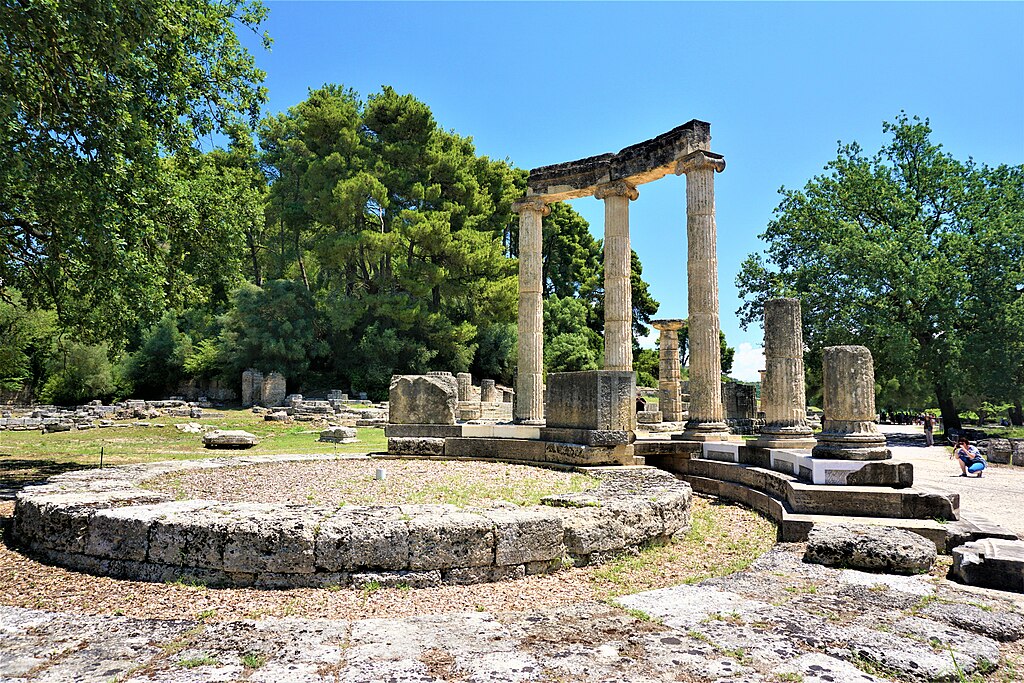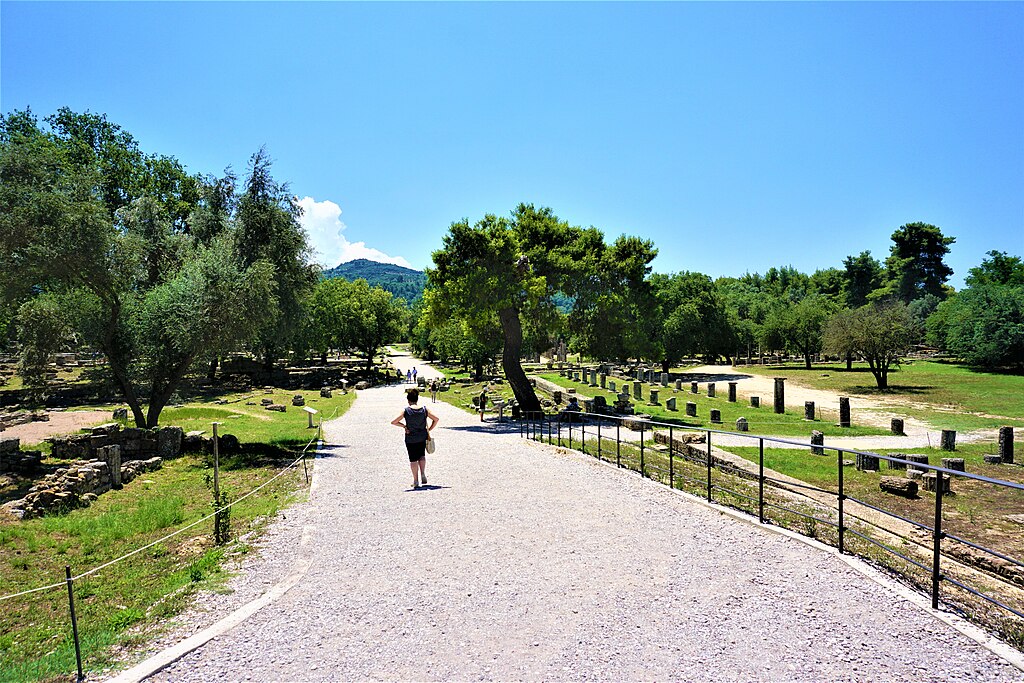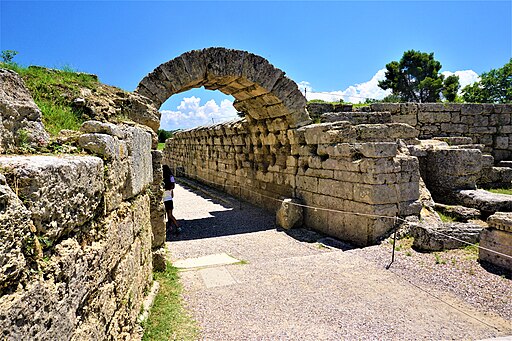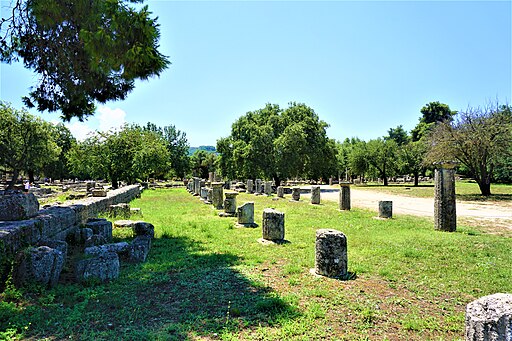
Olympia is a small town on the Peloponnese peninsula in Greece. It is famous as the site of the Ancient Panhellenic religious sanctuary of Ancient Greece, where the ancient Olympic Games were held. The site was dedicated to Zeus and drew visitors from all over the Greek world. Olympia was the predominant “Panhellenic” center that helped to build the identity of the ancient Greeks as a nation. Despite the name, it is nowhere near Mount Olympus in northern Greece.
The Olympic Games were held every four years throughout Classical antiquity, from the 8th century BC to the 4th century AD. The archaeological site held over 70 significant buildings and the ruins and foundations of many of these survived.
A Tour of Museums in Olympia
- Archaeological Museum of Olympia
- The Archaeological Museum of Olympia, in Olympia first opened in 1882. It was the first modern museum in Greece outside of Athens to open. The museum collection includes discoveries from the surrounding area, including the site of the Ancient Olympic Games. The collection includes objects from prehistory to its time under Roman rule.
- Museum of the History of the Olympic Games of Antiquity
- The Museum of the History of the Olympic Games of Antiquity has over 400 exhibits, dated from the prehistoric period to the 5th century A.D. The museum traces the historical development of the Olympic Games and the other Panhellenic festivals. The other critical festivals in addition to the Olympic games were the Pythian at Delphi, the Nemean at the sanctuary of Zeus at Nemea and the Isthmian Games at the temple of Poseidon near Corinth
Olympia Archaeological Site

Olympia Archaeological Site
The first Olympic festival and games were organized on the site of Olympia in 776 BC. The earliest evidence of building activity on the site dated from around 600 BC when the Temple of Hera was built. The first stadium was constructed around 560 BC and was remodeled around 500 BC with sloping sides for spectators. Throughout the 6th century BC, a range of sports was added to the Olympic festival. The golden age of the site at Olympia was during the classical period of the 5th and 4th centuries BC when a range of new religious and secular buildings and structures were constructed.
The Temple of Zeus was built in the middle of the 5th century BC. Sporting facilities, including the Hippodrome for chariot-racing, the Prytaneion, and the Greek Baths, were also constructed in the 5th century BC. In the late classical period, further structures were added to the site.
The late 4th century BC saw the erection of the Philippeion. Around 300 BC, the largest building on the site, the Leonidaion, was constructed to house distinguished visitors, and further athletic buildings were constructed. Finally, in 200 BC, a vaulted archway was erected, linking the entrance of the stadium.
During the Roman period, the games were opened up to all citizens of the Roman Empire. Also, a program of new buildings and extensive repairs were undertaken. The Olympic festival continued to be held at the site until the last Olympiad in 393 AD, after which the Christian emperor Theodosius I implemented a ban. Earthquakes devastated the site in the 6th century, and repeated floods ensured that the settlement was finally abandoned altogether in the early 7th Century.
A Tour of the Olympia Archaeological Site
Olympia is famous as the site where the ancient Olympic Games were held. The Olympic Games were held every four years from the 8th century BC to the 4th century AD. The archaeological site held over 70 significant buildings and the ruins and foundations of many of these survived.

This Vaulted archway is the entrance of the Stadium from 200 BC

Gymnasium – 2nd Cent. BC

Philippeion, Olympia

Temple of Hera, Olympia

The Stadium at Olympia
Olympia Museums
- Location: Olympia
- Greek: Αρχαία Ολυμπία
- Country: Greece
Olympia Map
A Tour of Greek Museums and Historic Sites
- Athens Museums
- Ancient Corinth Museums
- Delos Museums
- Delphi Museums
- Ancient Mycenae Museums
- Epidaurus Museums
- Heraklion, Crete Museums
- Meteora Museums
- Milos Museums
- Mykonos Museums
- Mystras Museums
- Nafplion Museums
- Olympia Museums
- Pella Museums
- Samos Museums
- Santorini Museums
- Thessaloniki Museums
- Vergina Museums
Museums in Athens
- Acropolis Museum
- National Archaeological Museum
- Benaki Museum
- Goulandris Museum of Cycladic Art
- Byzantine and Christian Museum
- Hellenic Motor Museum
- National Historical Museum, Athens
- Museum of the Ancient Agora
- Syntagma Metro Station Archaeological Collection
- Numismatic Museum of Athens
- Athens War Museum
- Jewish Museum of Greece
- Athens University Museum
Athens Historical Sites
- Acropolis of Athens
- Athens Temples, Monuments and Historical Archaeological Sites
- Temple of Olympian Zeus, Athens
- Corinthian Columns of Temple of Olympian Zeus
- Ancient Agora of Athens
- Map of the Ancient Agora of Athens
- Stoa of Attalos
- Aristotle’s Lyceum
- Temple of Hephaestus
- Roman Agora, Athens
- Roman Baths in Athens
- Temple of Poseidon at Sounion
- Tomb of the Unknown Soldier, Athens
Thessaloniki Museums
- Archaeological Museum of Thessaloniki
- Museum for the Macedonian Struggle (Thessaloniki)
- Atatürk Museum
- War Museum of Thessaloniki
Thessaloniki Historical Sites
- Roman
- Triumphal Arch of Galerius
- Early Christian and Byzantine Monuments
- Ottoman
- Bey Hamam
- Bezesteni Market
- White Tower of Thessaloniki
- Post-Byzantine
- Trigonion Tower
Delphi Museums and Historical Sites
- Delphi Archaeological Museum
- Archaeological Site of Delphi
Delos Museums and Historical Sites
- Archaeological Museum of Delos
Santorini Museums
- Akrotiri Archaeological Site
Olympia Museums and Historical Sites
- Archaeological Museum of Olympia
- Museum of the History of the Olympic Games of Antiquity
- Olympia Archaeological Site
Corinth Museums and Historical Site
- Archaeological Museum of Ancient Corinth
Mycenae Museum and Historic Site
- Archaeological Museum of Mycenae
Epidaurus Museum & Historic Site
- Archaeological Museum of Epidaurus
- Ancient Theater of Epidaurus
Heraklion, Crete Museum & Historic Site
- Knossos Archaeological Site
- Archaeological Musem of Heraklion
Meteora Historic Site
- Meteora Monasteries
Milos Museum & Historic Site
- Milos Museum
Mystras Historic Site
- Fortified Medieval Mystras
Pella Museum & Historic Site
- Archaeological Museum of Pella
~~~
“Holding an Olympic Games means evoking history. ”
– Pierre de Coubertin
~~~
Photo Credit: JOM
Popular this Week Sponsor your Favorite PageSEARCH Search for: Search Follow UsJoin – The JOM Membership Program
Sponsor a Masterpiece with YOUR NAME CHOICE for $5
Share this:
- Tweet
